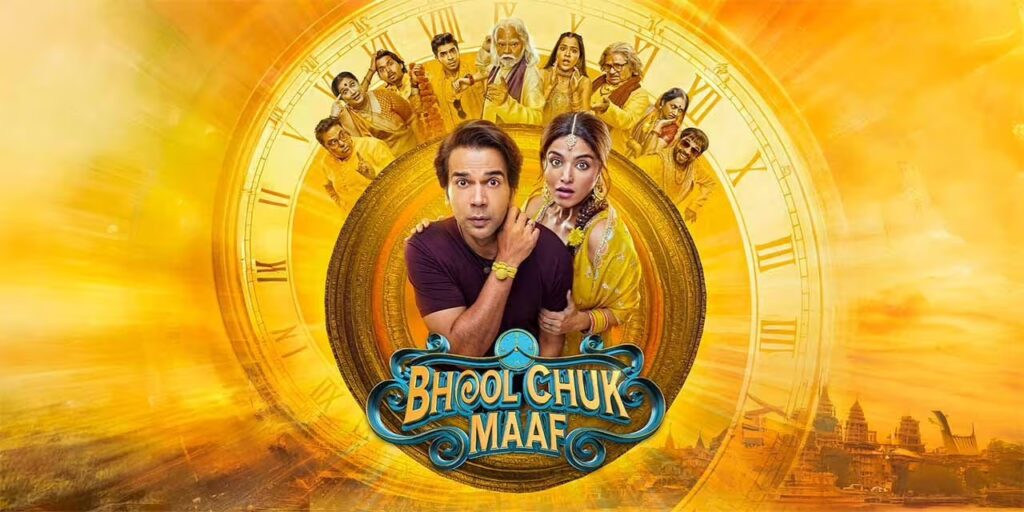
Movie Review: Bhool Chuk Maaf (2025)
Director: Anubhav Sinha
Cast: Pankaj Tripathi, Radhika Apte, Rajkummar Rao, Sheeba Chaddha, Manoj Pahwa
Genre: Social Drama
Language: Hindi
Rating: 4/5
Anubhav Sinha, known for his hard-hitting narratives (Article 15, Thappad), returns with Bhool Chuk Maaf, a film that is both emotionally resonant and socially reflective. With an ensemble cast led by the ever-reliable Pankaj Tripathi and Radhika Apte, the movie is a compelling blend of personal redemption and societal commentary.
Plot Summary:
Set in a small town in Uttar Pradesh, Bhool Chuk Maaf follows the journey of Vishwanath (Pankaj Tripathi), a retired school principal grappling with the consequences of his past decisions. In his youth, he had expelled a student, Imran (played in adulthood by Rajkummar Rao), over a minor incident. That one decision, clouded by personal prejudice and societal pressure, derailed the student’s life. Years later, haunted by guilt, Vishwanath seeks forgiveness—not just from Imran, but from his own conscience.
Parallel to Vishwanath’s journey is the story of Meera (Radhika Apte), a passionate social worker and advocate for education reform, who unknowingly becomes the bridge between the two men. As Meera digs deeper into Vishwanath’s past, she uncovers a web of systemic discrimination, personal bias, and hidden truths.
Themes and Execution:
Bhool Chuk Maaf is not just about asking for forgiveness—it’s about recognizing the weight of one’s actions, especially in a position of authority. The film delves into themes of casteism, communalism, and generational trauma, but does so with subtlety and care. Sinha doesn’t preach; he provokes thought. The screenplay, co-written by Sinha and Sudhir Mishra, balances emotional depth with moments of dry humor and irony.
The movie raises important questions: Can a single moment of prejudice define a life? Is apology enough for the damage done? And can society ever forgive those who’ve made irreversible mistakes?
Performances:
Pankaj Tripathi delivers one of his career-best performances. As Vishwanath, he is restrained yet powerful, portraying guilt not through grand gestures but with silence, body language, and eyes heavy with regret. His transformation—from a proud educator to a humbled man seeking redemption—is heartbreakingly believable.
Radhika Apte shines as Meera. Her role is less about drama and more about impact. She becomes the voice of reason, challenging Vishwanath’s past and offering perspective without being overtly confrontational. Her dialogues are sharp and poignant, and Apte delivers them with conviction.
Rajkummar Rao, though not present throughout the film, leaves a lasting impression. As the grown-up Imran, his scenes are emotionally charged and layered. The confrontation between Vishwanath and Imran in the final act is one of the most powerful moments in the film—raw, intense, and honest.
Sheeba Chaddha and Manoj Pahwa, in supporting roles as Vishwanath’s wife and friend, add depth and humanity to the narrative. Their presence brings moments of levity and warmth, making the story more grounded.
Cinematography and Music:
Ewan Mulligan’s cinematography captures the dusty lanes, cramped classrooms, and decaying libraries of small-town India beautifully. The visual tone reflects the weight of the story—muted colors, long silences, and carefully composed shots create an immersive experience.
The music by Mangesh Dhakde is minimal yet effective. The background score never overpowers the narrative but complements it perfectly. The use of silence in key scenes adds to the film’s emotional heft.
Direction:
Anubhav Sinha proves yet again that he is a master of socially conscious cinema. His direction is confident and assured, allowing the characters to breathe and the story to unfold naturally. He doesn’t force sympathy for Vishwanath but presents him as a flawed human being—making the audience decide whether he deserves forgiveness.
Sinha’s strength lies in making personal stories feel universal. Whether it’s the portrayal of institutional bias or the burden of moral failure, he tells these stories with empathy and precision.
Final Verdict:
Bhool Chuk Maaf is not just a film—it’s a mirror. It reflects the little wrongs that snowball into lifelong consequences. It doesn’t offer easy answers, but it makes you pause and reflect, which is what great cinema does. Backed by stellar performances and a thought-provoking script, it’s a film that will stay with you long after the credits roll.
Whether you’re a fan of social dramas or just looking for a powerful story told with nuance and care, Bhool Chuk Maaf is worth your time.
Best Movie Review Rating: 4/5